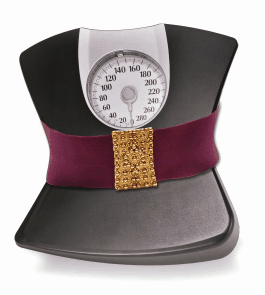Anyone who has wandered into the realm of weight control is aware of the notorious, steadfast tool known as the bathroom scale– and the love/hate relationship that goes with it. If it isn’t the prompt that springboards an individual’s resolve to lose unwanted pounds, it’s used to track the progress of a diet that’s already underway. More often than not, it is also the very thing that knocks dieters off their regimen regardless of how long they have (or haven’t) been on it.
 Most dieters start out weighing themselves on a daily basis merely to gauge whether or not their current efforts are working. This may or may not be a good idea. As stated by some weight loss plans and professionals, weighing oneself each day can lead to disappointment and sabotage when the numbers don’t go down fast enough, stay where they are or even go slightly higher, as is sometimes the case in the beginning of a diet.
Most dieters start out weighing themselves on a daily basis merely to gauge whether or not their current efforts are working. This may or may not be a good idea. As stated by some weight loss plans and professionals, weighing oneself each day can lead to disappointment and sabotage when the numbers don’t go down fast enough, stay where they are or even go slightly higher, as is sometimes the case in the beginning of a diet.
On the other hand, stepping on the scale each day has been shown to stimulate some dieters to not only lose weight faster but keep it off two years longer than those who weigh themselves less frequently. Those who weigh every day tend to be better at holding themselves accountable and are more apt to spot patterns in weight gain. This allows greater opportunity to modify eating and exercise patterns before it is too late.
Weighing less frequently (such as once a week or even once a month) tends to be most helpful for dieters who are easily discouraged or who have a significant amount of weight to lose. Seeing the normal fluctuations that occur in the body as it adjusts to a new health regimen often triggers these types to turn their diet into a numbers game. This can lead to yo-yo dieting and a bitter attitude toward watching one’s weight.
In order to sabotage the scale before it sabotages them, it is essential for weightwatchers in these categories to employ additional tactics. The first is to select a diet regimen that not only helps establish realistic weight loss goals but provides a clear understanding of the overall process. The second is to ignore the scale altogether for the first month of the new diet and spend that time fostering good feelings about getting into healthy habits.
Whether choosing to weigh in on a daily basis or at less frequent intervals, anything from fluid consumption to menstruation to a slight gain in muscle mass will affect the numbers on a scale. Hitting plateaus (where the numbers don’t move up or down at all) are just as common during the weight loss process. The key is not to panic and remember that getting to a certain weight is rarely ever a straight line between point A and point B.
Weight loss professionals still maintain the best time of day to get an accurate measure of one’s weight is first thing in the morning. This is because, during a period of sleep, fluid levels and digestive processes have plenty of time to stabilize. However, there is no problem if a dieter feels better stepping on the scale before bedtime. As long as one is weighing in at the same time of day, an accurate track of progress can be established.

